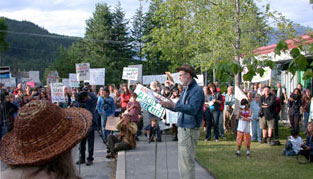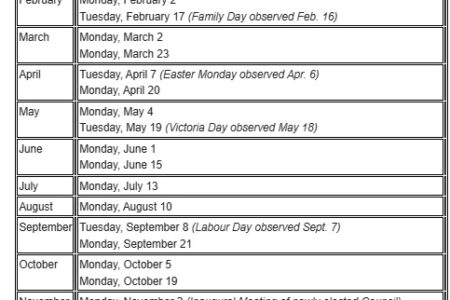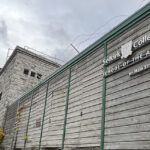MP Atamanenko Throws Support Behind Community Opposition to Kootenay IPP
Castlegar, BC – Before a public meeting in Kaslo on Wednesday that drew 1100 citizens from the town and other Kootenay communities, MP Alex Atamanenko (BC Southern Interior) told one of the largest crowds ever assembled against a proposed Independent Power Project (IPP) “This Glacier-Howser IPP must be stopped in its tracks!”
Addressing a rally outside the local school where the Environmental Assessment Office and proponent AXOR’s presentations took place, the NDP MP pointed out that the proposed project is the largest “run-of-the-river” project in the Kootenays.
“This IPP irreparably damages the environment. It drains and permanently diverts four creeks through 16 km of tunnels into Duncan Dam reservoir. It constructs 92 km of power line through the Purcell mountain wilderness, through some old-growth forest management areas, – areas that are off-limits to logging, due to their high ecological value.
“Worst of all, the BC government has been misleading its citizens. This province has set up private companies to line their pockets and sabotage our publicly-owned and accountable BC Hydro. Moreover, IPP power will be exported at a financial loss to the Province. It makes no economic sense and will hurt the people of BC,” said Atamanenko.
“Private power producers do not assume the final financial risk for each proposed power project. BC citizens do, because BC Hydro guarantees them a premium price for their power. Where BC Hydro has been buying power off the grid at low prices and selling to the US when prices are high, the Province has now forced Hydro to buy from IPPs at a needlessly high price and sell to the US market at a loss.
“The Liberal Government’s Energy Policy requires BC Hydro to purchase so much power from IPPs that the surplus generated during spring freshets cannot be stored. Hydro will have no choice but to sell during the season when power is cheapest (typically about 3 cents per kilowatt-hour (kWh), while being forced to guarantee 7 to 8.5 cents/kWh to the IPPs. British Columbians end up heavily subsidizing the IPPs and the US market. Where is the economic sense?” asked Atamanenko.
“The cost of the subsidies will appear in the form of BC Hydro rate increases. According to the Province’s own 2009 Crown Corporation’s Service Plan, rates will start to climb this year by over 6%, and rise an additional 21% in the next three years.
“What will happen to $160 to $300 million per year in public revenues that BC Hydro previously been able to generate from electricity trade for BC citizens and our hospitals and schools?” he asked.
Kaslo resident Don Scarlett, a local engineer who designs and builds micro-hydro projects to serve area homes and businesses, has studied the economics of IPPs.
“Despite claims that exported BC “green” power will displace dirty coal-fired power in the US, history and common sense dictate that Americans will happily take any new source of inexpensive electricity and use it to support further economic growth,” said Scarlett. “IPP power won’t even help Americans reduce greenhouse gas emissions.”
“The Liberal BC government says their energy policy is about providing energy security for BC, but in fact it is all about exporting power.
“Their negotiations with California, and the timing of IPP power production – which peaks in the spring and early summer freshet – betray the fact that the power is destined for the US market which has its highest demand during air-conditioning season,” said Scarlett.
“The BC Interior will be spoiled to serve the US market at a financial loss,” said Atamanenko. “This isn’t ‘run of the river’. This is ‘RUIN of the river!’”
For more information:
Alex Atamanenko 250-365-2792 1-800-667-2393
Don Scarlett 250-353-2563


























Comments